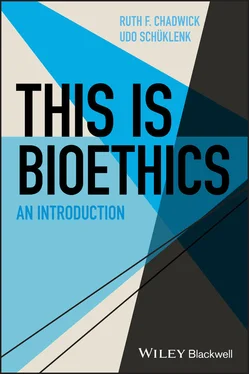This Is Philosophy: An IntroductionSteven D. Hales
This Is Philosophy of Mind: An IntroductionPete Mandik
This Is Ethics: An IntroductionJussi Suikkanen
This Is Political Philosophy: An IntroductionAlex Tuckness and Clark Wolf
This Is Business Ethics: An IntroductionTobey Scharding
This Is MetaphysicsKris McDaniel
This Is Bioethics: An IntroductionRuth F. Chadwick and Udo Schüklenk
This Is EpistemologyAdam Carter and Clayton Littlejohn
Forthcoming:
This Is Philosophy Of ReligionNeil Manson
This Is Philosophy: An Introduction, 2nd editionSteven D. Hales
This Is Philosophy of Mind: An Introduction, 2nd editionPete Mandik
THIS IS BIOETHICS: AN INTRODUCTION
RUTH F. CHADWICK
UDO SCHÜKLENK

This edition first published 2021 © 2021 John Wiley & Sons, Inc.
All rights reserved. No part of this publication may be reproduced, stored in a retrieval system, or transmitted, in any form or by any means, electronic, mechanical, photocopying, recording or otherwise, except as permitted by law. Advice on how to obtain permission to reuse material from this title is available at http://www.wiley.com/go/permissions.
The right of Ruth F. Chadwick and Udo Schüklenk to be identified as the author of this work has been asserted in accordance with law.
Registered Office John Wiley & Sons, Inc., 111 River Street, Hoboken, NJ 07030, USA
Editorial Office 111 River Street, Hoboken, NJ 07030, USA
For details of our global editorial offices, customer services, and more information about Wiley products visit us at www.wiley.com.
Wiley also publishes its books in a variety of electronic formats and by print‐on‐demand. Some content that appears in standard print versions of this book may not be available in other formats.
Limit of Liability/Disclaimer of Warranty While the publisher and authors have used their best efforts in preparing this work, they make no representations or warranties with respect to the accuracy or completeness of the contents of this work and specifically disclaim all warranties, including without limitation any implied warranties of merchantability or fitness for a particular purpose. No warranty may be created or extended by sales representatives, written sales materials or promotional statements for this work. The fact that an organization, website, or product is referred to in this work as a citation and/or potential source of further information does not mean that the publisher and authors endorse the information or services the organization, website, or product may provide or recommendations it may make. This work is sold with the understanding that the publisher is not engaged in rendering professional services. The advice and strategies contained herein may not be suitable for your situation. You should consult with a specialist where appropriate. Further, readers should be aware that websites listed in this work may have changed or disappeared between when this work was written and when it is read. Neither the publisher nor authors shall be liable for any loss of profit or any other commercial damages, including but not limited to special, incidental, consequential, or other damages.
Library of Congress Cataloging‐in‐Publication Data
Names: Chadwick, Ruth F., author. | Schüklenk, Udo, author.
Title: This is bioethics : an introduction / Ruth F. Chadwick, Udo Schüklenk.
Other titles: This is philosophy (Series)
Description: Hoboken, NJ : Wiley‐Blackwell, 2020. | Series: This is philosophy | Includes bibliographical references and index.
Identifiers: LCCN 2020029285 (print) | LCCN 2020029286 (ebook) | ISBN 9781118770740 (paperback) | ISBN 9781118770795 (adobe pdf) | ISBN 9781118770733 (epub)
Subjects: MESH: Bioethical Issues | Bioethics
Classification: LCC R724 (print) | LCC R724 (ebook) | NLM WB 60 | DDC 174.2–dc23
LC record available at https://lccn.loc.gov/2020029285LC ebook record available at https://lccn.loc.gov/2020029286
Cover design: Wiley
Ruth F. Chadwickis Professor Emerita, Cardiff University and Visiting Professor, University of Leeds. She co‐edits the journal Bioethics and has served on numerous bodies including the Council of the Human Genome Organisation. She is Fellow of the Academy of Social Sciences, the Hastings Center, New York, the Royal Society of Arts, the Royal Society of Biology and the Learned Society of Wales.
Udo Schüklenkholds the Ontario Research Chair in Bioethics in the Department of Philosophy at Queen’s University at Kingston, in Canada. He is a Joint Editor‐in‐Chief of the journal Bioethics . Born in Germany, his academic career has included teaching and research appointments in Australia, South Africa, and the UK.
PREFACE AND ACKNOWLEDGMENTS
Jeff Dean, our then Commissioning Editor at Wiley‐Blackwell, suggested to one of us in 2014 to produce a bioethics introductory text. It’s always easier to agree to do a thing, then to actually do it, and so it took a ‘mere’ six years – on and off – to write this volume for you. Marissa Koors, Jeff Dean’s successor at Wiley, and Steven D. Hales, our long‐suffering series editor for the This is Philosophy series at Wiley‐Blackwell, showed an unusual degree of patience with us, our book, and our seemingly never‐ending delays. There is a German saying along the lines that a good thing takes time. You be the judge on This is Bioethics . Last but by no means least, we owe a great deal of gratitude to Nivetha Udayakumar, this book’s Production Editor, for a job very well done.
Both of us have spent our academic careers in the field of bioethics, we jointly have been Editors of Bioethics , arguably the top philosophical bioethics journal, for more than two decades. Still, as we discovered, it’s one thing to successfully author and publish peer reviewed research content, and it’s quite another to write content specifically for introductory, and for teaching purposes. We deliberately did not review other bioethics textbooks to decide on what to include or not to include as far as the book’s content is concerned. This book reflects what we think a student of bioethics, who takes an introductory course, should – at a minimum – have read and thought about. Quite deliberately we kept the tone informal, aiming to strike a conversational tone. We also quite deliberately avoided technical jargon where that was possible. Some of the external reviewers of an earlier draft of this manuscript had mixed feelings about this. We hope it works for you!
How should you go about reading this book? For one thing, we included plenty of links to sites that we hope won’t have disappeared by the time you read this. Check them out if a particular issue catches your interest, and you want to know more. Definitely read Chapters 1– 4, in that order, the other chapters can mostly be read independently of each other, even though we have taken care to cross‐reference relevant content in other chapters where that was appropriate. We have also added guiding questions at the end of each chapter. We strongly recommend that you take a moment to reflect on these questions. Thinking about defensible answers will assist you in using the concepts and arguments you read about, and so you will gain a better understanding of them and their respective strengths and weaknesses. If you choose to do so, you would likely find yourself in a better position to defend your views on any number of current‐day contentious issues, based on sound ethical analysis.
Читать дальше













